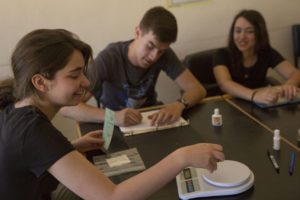Field School: Registry
Posting from the Abila Archaeological Project.
My favorite room at camp is the registry. In layman’s terms, it’s where cool stuff gets sorted and documented. During field school, dozens of JBU students crammed into the registry for a training session. They clustered around desks covered with Munsell soil charts, rulers, pail tags and microscopes.
Peter, our resident priest and registrar, explained that archaeology is destruction, purposeful demolition for the sake of learning. Because the sediment and artifacts we uncover can never be returned to their original state, documenting our work with great care is critical to honoring history.
After providing context for the registry process, Peter outlined how to handle dig finds.
“When you find a nail, place it in a paper bag so it doesn’t oxidize.”
“Fill the buckets with water when you get off the bus.”
“Label your pail tags with a permanent marker, so the ink doesn’t wash off when we soak the pottery.”
“Start a new locus when you notice significant changes in soil color.”

As Peter spoke, students scribbled his words in their notebooks. Many looked stressed and perplexed. I’m sure some of them were even wondering the same questions I had my first dig season: Am I really cut out for this? What am I doing here?
I wanted to tell them, “It gets easier. It’s hard to remember everything, but you’re smarter than you think. We’re glad you’re here,” but I kept quiet.
Fortunately, Peter closed the training session with something even better: “Be kind to your square partner. Be kind to your supervisor. Be kind to the other workers.” He paused. “And be kind to yourself.”
Peter explained that our dig team includes a few archaeology experts, but the majority of our staff has zero experience in the field. We’re all stepping into something new as we probe at the soil, unsure of what we’ll find below. We’re bound to make mistakes. At some point or another, we’ll mislabel the loci in our top plans. We’ll forget to use permanent marker on pail tags. We’ll place bones in the wrong type of bags. We’ll assume an ordinary rock is a piece of ancient pottery. At the end of the day, we’re just humans doing our best.
I hope that some of Peter’s words stick. After this dig season, many of these JBU students will graduate. A few plan to continue studying history, but the majority will go on to become teachers, engineers, musicians, nurses, designers and social workers.
Realistically, this is the last time many students will have the opportunity to excavate ancient ruins. Years down the road, they may not remember how they labeled loci on top plans or used the Munsell soil chart. Still, I hope they’ll remember one lesson from the registry: always, always be kind to others and be kind to yourself.


No comments yet.
Add your comment